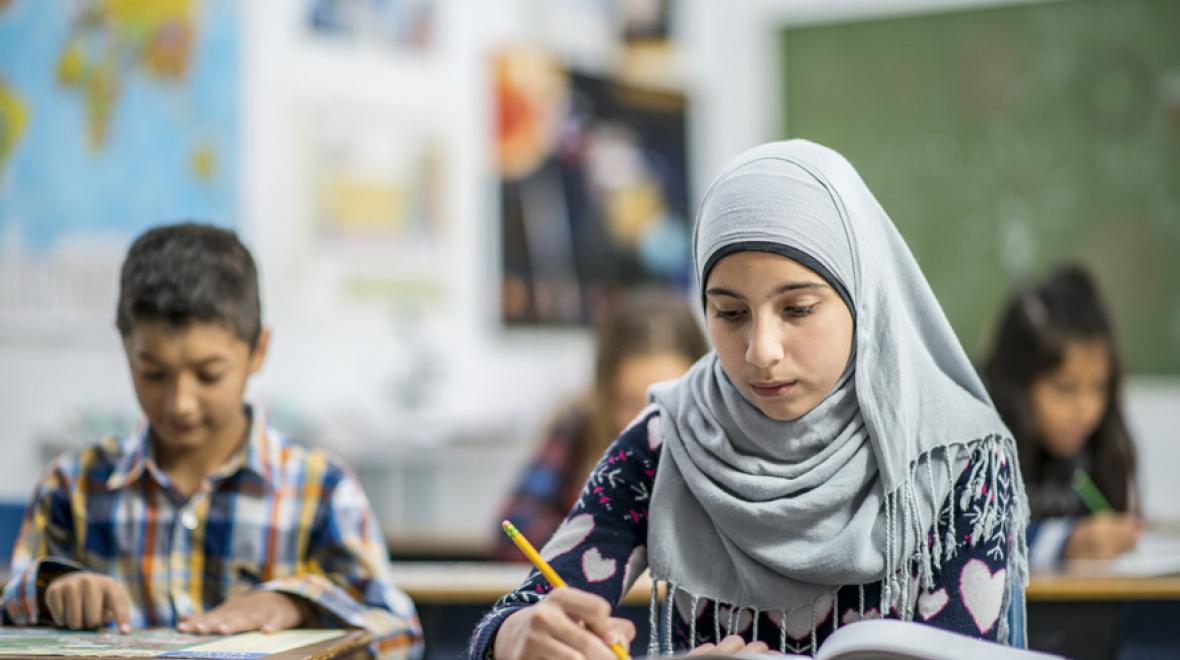
This story was co-reported and co-written by Jenna Vandenberg and Sobia Sheikh.
During Ramadan, students in some Muslim-majority countries don’t have to worry about passing high-stakes tests or attending several hours of classes. School days are shortened, and Fridays are designated holidays. This leaves students free to pray and celebrate with their families, grab naps during the day, and rejuvenate in preparation for nighttime meals and prayers.
Muslim students in the United States do not have this luxury. Fitting classes, extracurricular activities and finals into Ramadan makes for an exhausting month.
Ramadan, one of the five pillars of Islam, is a period of time when Muslims strive for spiritual purification, which is achieved through fasting, self-sacrifice and prayer. Most Muslims refrain from eating and drinking in the hours between sunrise and sunset. A typical day during Ramadan begins with Suhoor, a pre-dawn meal eaten around 2–3 a.m. Fajr, the morning prayer, follows. Fasting lasts until Maghrib prayer at sunset. During Isha, the final prayer of the day, many gather nightly at the mosque to read Taraweeh. Lead by the imam, an Islamic scholar, this prayer can last up to two hours. Muslims also celebrate Eid-al-Fitr, which marks the end of Ramadan. Eid starts with a morning prayer and is followed by communal celebrations with friends and family which can last up to three days.
The Islamic calendar is a lunar calendar, so Ramadan begins approximately 10 days earlier each year. The basis of determining the first and last days of Ramadan is by the sighting of the new moon. However, there are people who follow the astronomical calculation, which is why there may be some uncertainty about which day Ramadan starts. This year, Ramadan will begin around March 10 and will end around April 9.
This means that an Islamic student must weigh a series of conflicting concerns:
- Where should I go during lunch time?
- How will I make up missed work if I miss school days to celebrate Eid-al-Fitr?
- Will my teachers pepper me with personal questions about fasting?
- Should I wake up in the middle of the night to eat Suhoor with my family, or sleep through it to be well-rested but hungry the next day?
While most Muslims do not start fasting until ages 12–14, often young children may fast for a few hours or choose certain days to fast to get in the habit of praying and fasting.
When asked how the district was supporting students during Ramadan, Tim Robinson, the media relations specialist for Seattle Public Schools, shared a letter template that principals could send out to families. It states: “Schools are required to follow the state-mandated testing window and cannot change the testing window… For families observing Ramadhan, please let your teacher/principal know how we can best accommodate your students/family during this time.”
While schools are required to follow the state’s testing window, that window does extend beyond Ramadan. The state allows schools to administer the online version of the Smarter Balanced Assessment (SBA) tests any time during the last 12 weeks of the school year, provided testing is complete by June 7. The paper testing time is, however, limited to May.
At Mariner High School in Everett, school administrators met with Muslim students to give them some options for taking their required SBA tests. Several opted to take their tests in late April rather than wait until the end of May, when the rest of the school will be testing. AP tests, however, follow a strict nationwide schedule which does not accommodate religious considerations.
Mariner also ensured that prom would be held before Ramadan, so seniors would not have to choose between a night of prayer and their final high school dance. Teachers also plan to open classrooms during lunch to provide a quiet space to sleep, pray or escape the cafeteria. Female students, who do not fast when they are on their menstrual cycle, also have a space where they can eat without needing to answer any intensely personal question about why they are not fasting.
Still, Muslim students wish their teachers were a bit more sensitive. They appreciate teachers who refrain from playing music or passing out candy during class, and those who provide a subtle nudge rather than a scalding rebuke if they nod off. “My teachers can support me best by being willing to understand the fatigue that I experience in this month of fasting,” said Sarah, a senior at Mariner. “It would be especially helpful if my teachers would allow me to work at my own pace during Ramadan.”
Many students also weigh the pros and cons of taking a day or two off during Eid-al-Fitr to celebrate the end of Ramadan. While several school districts on the East Coast and around Detroit have set Eid-al-Fitr as a school holiday, this has not been done in the Seattle area.
In a time when society is coming to understand Islam, it is crucial that our schools and educators understand how to support the needs of Muslim students. Public schools should be a welcoming place for all students, regardless of when or if they eat, sleep and pray.











